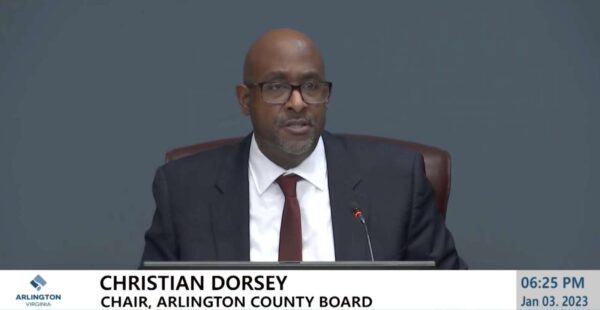
Missing Middle — and the ongoing side-conversation about civility this topic has prompted — are front and center for the Arlington County Board this year.
Members all opined on the potential zoning changes last night (Tuesday) during their first meeting of the year, when they also unanimously elected Christian Dorsey as the chair and Libby Garvey as the Vice-Chair for 2023.
A lot changed in 2022: Covid was a top priority this time last year but this year, the pandemic barely registered a blip at yesterday’s annual organizational meeting. Instead, increasing housing while bridging divisions in the community dominated their speeches, which are reprinted online.
Board members said they will also prioritize addressing office vacancies — a portent of this year’s uncertain economic outlook — as well as climate change and equity in the new year.
Dorsey committed to ushering in new policies to increase the supply of housing and ensure a range of prices and housing types.
Today, and during my year as Chairman, I plan to lead the community through the development of a set of housing policies to meet the challenge of this generation to make Arlington a place for young families, for seniors and for everyone in between.
I suggest that our housing policies be guided by five principles where I believe there is broad agreement:
- First, Arlington should be open to all. Inclusive communities are dynamic and best positioned to be resilient. Barriers to entry should be identified and dismantled. This is a foundation principle.
- Second, our planning for the future should, as always, be community based, and that means engaging all stakeholders in our community and incorporating thoughtful views.
- Third, planning should be iterative, allowing us to course correct when necessary and evolve over time.
- Fourth, to the greatest extent practicable, living anywhere in Arlington should not be determined by income levels. Our attention to vibrant and diverse communities should span across all our 26 square miles.
- Fifth, planning to meet our housing goals must be integrated with our interconnected priorities of: creating transit and active transportation-oriented communities that are safe for all users, reducing greenhouse gas emissions and attracting and retaining employers that support good jobs for workers.
His vice-chair, Garvey, said Missing Middle is really a conversation about what kind of Arlington residents want, and this has sowed division and upset more people than any other issue she has worked on. (An anti-Missing Middle rally is planned this weekend, for instance.)
Think about the simple phrase, “I love Arlington.” One person says that and is thinking about our quiet, leafy neighborhoods with houses far apart. Another says the same thing, but means the lively, vibrant and noisy urban corridors. They use the same words, but they mean very different things.
To those differing views expressed with the exact same words, throw in the nature of people to hear what they expect to hear rather than what is actually said. Add to that our own government tendency to respond with more and more information, which makes it harder for a clear message to come through. Top it all off with the current climate where opponents like to demonize each other and catastrophize outcomes. Then bake it in a social media stew where misinformation, rumors and fears fly through a community. You have a recipe for a real communication trouble.
Matt de Ferranti, who was re-elected in November, urged people be civil and said he will work “toward a thoughtful Missing Middle policy that builds consensus.”
Consensus is not unanimity but it respects the voices of all and looks to serve the greatest good. While not everyone will be happy with any particular decision, our community as a whole should feel heard and understand the reasoning that prevails in votes taken by the Board. Civility will be more important in 2023 than it has ever been in my time on the Board. Let’s debate the policy and avoid casting aspersions on neighbors’ motives. The details matter. Your questions, our answers and our conversation are the heart and soul of civic life.
Takis Karantonis said Arlington successfully managed growth in the 20th century with transit-oriented development, but has missed the mark this century in providing enough housing and enough options.
“In the 21st century, the need emerges for a planned and community-anchored… transition to gently distributed density beyond and between our [transit] corridors,” he said, adding that there need to be “reasonable safeguards in place to manage potential adverse effects without…. stifling the benefits of allowing the market to provide a wider variety of housing choices to a wider variety of residents.”
Immediate past chair Katie Cristol said she has advocated for action on Missing Middle for seven straight organizational meetings. She’s already thinking about what’s next for zoning Arlington’s lowest-density neighborhoods.
“There is exciting new thinking from our community and staff about how we can adjust our zoning to better achieve our goals of preserving tree canopy and minimizing impacts on neighboring properties,” she said, citing ways to protect backyard trees and get more prescriptive about home sizes.
Both of these ideas “reflect that the ingenuity of this community is up to the challenge of shaping our long-run future,” she said.
Dorsey, who was first elected in 2015, served as Vice-Chair last year and Chair in 2019, a period marred by a messy personal bankruptcy, tax filing and payment problems, and his resignation from the WMATA board following campaign finance ethics concerns. He and Cristol are both not seeking re-election this year. Their terms will end after Dec. 31.

